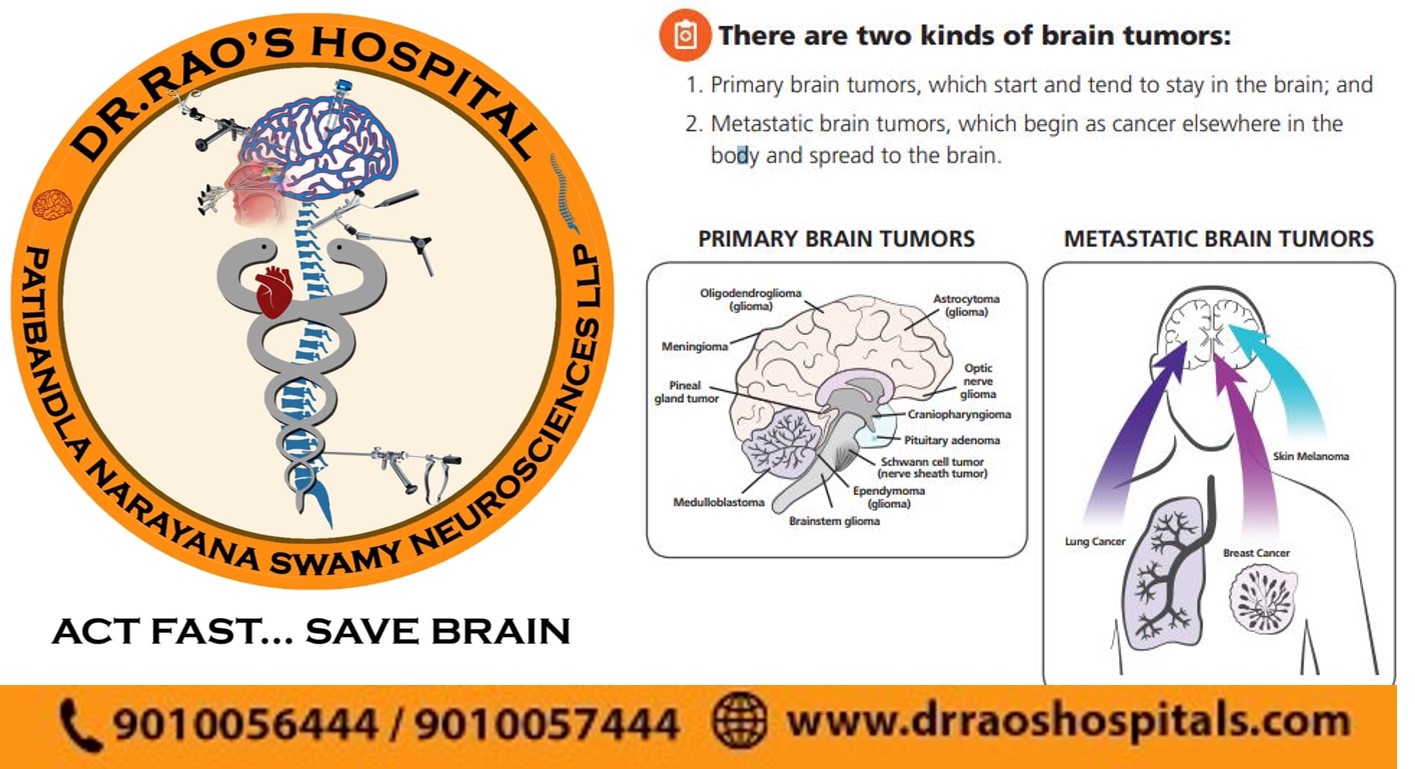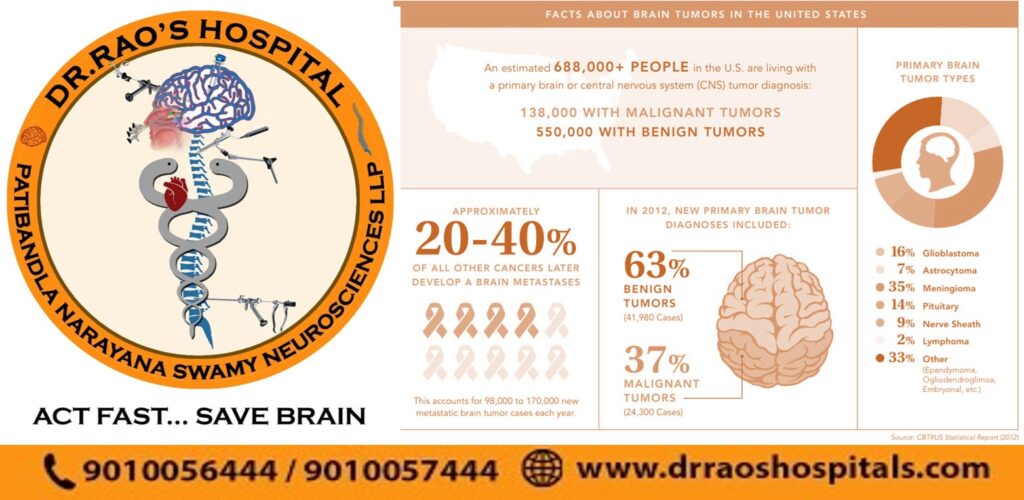The Best Brain Tumor Treatment in Andhra Pradesh
Dr. Rao’s Hospital offers the best brain tumor treatment in Andhra Pradesh. When you choose Dr. Rao’s Hospital for brain tumor treatment, you get access to experts who focus on brain tumors in a minimally invasive way.
Dr. Rao’s Hospital is the first of its kind in India, with only FDA-approved critical care equipment in the Neuro ICUs. Moreover, it is the first neurology hospital in India to offer all the neurosurgical treatment options under one roof.
Our Medical Head, Dr. Mohana Rao Patibandla, is an expert brain tumor doctor in Andhra Pradesh. He is among the few Neurosurgeons who are adept in all the subspecialties in the Neurosciences and trained in the USA.
Our hospital is the first in south India to have a total solution of the Stealth 8 Neuronavigation system. This system includes Stealth DTI and Frame Link, Intra-operative Xper Dual CT, Intra-operative neuromonitoring for precision and accuracy in the Neurosurgical treatment.
Since brain tumoCraniopharyngiomars account for only 1% to 2% of all cancer, most oncologists have limited experience treating and managing their symptoms. However, our neuro team includes neurologists, neurosurgeons, nurses, social workers, nutritionists. They exclusively examine patients with neuro-oncologic disorders and remain updated on the full range of standard and experimental strategies.
Read on more to know about Brain tumors, their types, symptoms, diagnosis, brain tumor treatment, etc.
What is a Brain Tumor?
The abnormal growth of cells in the brain forms a mass or lump termed a brain tumour. The growth rate and location of your brain tumour determine how it will affect your nervous system’s function.
What are the Types of Brain tumors?
1. Primary Brain Tumors:
The primary tumours develop when normal cells acquire errors (mutations) in their DNA. The mutations allow cells to grow and divide at increased rates and continue living when healthy cells die. It results in the growth of a mass of abnormal cells, which forms a tumour.
The primary tumours originate in the brain or the surrounding tissues, including the brain-covering membrane (meninges), cranial nerves, pituitary gland, or pineal gland.
Primary tumours are rare as compared to other cancers of the body. However, it constitutes about 1% to 2% of the total cancers. But it is responsible for around 20% of deaths due to cancer-related causes. The incidence is about 2/10000 people in India.
Primary tumours are both benign and malignant. About 33% of primary brain tumours are malignant. No age group is saved from brain tumours. It affects all from pediatric age groups to elderly patients.
There are various types of primary brain tumours. Each gets its name from the variety of cells involved. Examples include:
- Gliomas
- Meningiomas
- Acoustic neuromas (schwannomas)
- Pituitary adenomas
- Medulloblastomas
- Germ cell tumours
- Craniopharyngiomas
2. Secondary Brain Tumors:
Secondary tumours are metastatic from malignancies of other body parts. These tumours emerge from cancer that originates elsewhere in the body and then spreads to your brain.
These tumours most often develop in people with a history of cancer. But in rare conditions, a metastatic brain tumour may be the initial sign of cancer that originated elsewhere in your body.
The common types of cancer that can spread to the brain include:
- Breast cancer
- Colon cancer
- Kidney cancer
- Lung cancer
- Melanoma
Symptoms of Brain Tumor
- Change in the headache patterns
- Frequent and severe headaches
- Unexplained nausea or vomiting
- Vision problems
- A gradual loss of sensation or mobility in an arm or a leg
- Difficulty with balance or speech
- Confusion in everyday matters
- Personality or behaviour changes
- Seizures
- Hearing problems
When to consult a doctor?
Contact your doctor if you have persistent signs and symptoms that concern you.
Book an Appointment at Dr. Rao’s Hospital
Diagnosis of Brain Tumor
Your doctor may recommend the below tests and procedures to diagnose a brain tumour:
1. Neurological exam:
A neurological exam may include testing your vision, hearing, strength, balance, coordination, and reflexes. Problems in one or more areas may give signs about the part of your brain that may have a tumour.
2. Imaging tests:
- Magnetic Resonance Imaging (MRI)
- Computerized Tomography (CT)
- Positron Emission Tomography (PET)
3. Biopsy:
A biopsy can be implemented as part of surgery to remove the brain tumour.
Your surgeon may perform a stereotactic needle biopsy for brain tumours in hard-to-reach areas or susceptible areas within your brain that a more extensive surgery might damage. The biopsy sample is then observed under a microscope to find if it is cancerous or benign.
Brain Tumor Treatment in Andhra Pradesh
The treatment depends on the kind of brain tumour you have and its size and location.
1. Surgery
Surgery aims to remove the mass effect, obtain tissue for histopathological examination and excision of mass to cure the condition. The surgery focuses on total or gross total excision. But in the case of inoperable tumours, near-total excision or simple decompression is also done. Surgery causes immediate relief in mass effect.
The surgery usually cures benign tumours. But malignant tumours also require chemotherapy or radiotherapy as an adjuvant. Recurrence is the rule in the case of malignant brain tumours. But recurrence-free survival depends on the kind and grade of the brain tumour. Moreover, even after recurrence, surgery is the first line of management.
2. Neurophysiological Monitoring:
It is an advanced approach to neurological procedures. Many tumours are present in areas where any attempt to remove them may cause permanent neuro deficits. Intraoperative neurophysiological monitoring is the real-time recording of various brain activities during surgery.
Even touching vital structures can directly reflect changes in NP monitoring. NP can save those structures and avoid deficits. It helps in the safe excision of tumours.

3. Microscopy:
The use of a high-resolution microscope with some additional features dramatically facilitates mass identification and safe excision.
4. Stereotactic Radiosurgery:
It is a new concept that uses a stereotactic frame to approach the lesion without craniotomy and damage the vital structures. The tumours which are not attainable or at eloquent areas can be approached through stereotactic surgery.
It also helps obtain tissue for histopathological diagnosis. So, we can initiate other therapies. Thus, brain tumours that were considered untreatable are now treatable.

5. Gamma knife:
Gamma knife is a type of focused radiotherapy. It helps deliver computer software-based, multiple sources a high dose of radiation to the brain’s small diseased area without affecting surrounding brain tissue. Thus, avoiding the side effects of whole-brain radiation. A gamma knife can treat tumours that are inoperable or inaccessible.
6. Chemotherapy:
It has a limited role in brain tumours due to the presence of the blood-brain barrier. Few chemotherapeutic agents like carmustine, CCNU, temozolomide, cytarabine, procarbazine, vinblastine, etc., are effective against brain tumours. Chemotherapy is often done as an adjuvant to surgery.
7. Radiotherapy:
It is also adjuvant to surgery. As alone, it has a limited role but potential side effects in the form of radiation necrosis.
8. Immunotherapy:
It is in the developing phase. Few molecules are developed to target the molecular pathology of the brain tumour.
Brain Tumors We Treat
- Acromegaly
- Astrocytoma
- Brain metastases
- Brain stem gliomas
- Chordoma
- Craniopharyngioma
- Cushing’s disease
- Ependymomas
- Glioblastoma multiforme (GBM)
- Hemangioblastomas
- Meningioma
- Mixed glioma
- Optic nerve gliomas
- Non-functioning pituitary adenoma
- Pituitary cysts, including Rathke’s cleft cyst
- Prolactinoma
- Primary CNS lymphoma
- Primitive neuroectodermal (PNET)
- Sub ependymoma
- TSH-producing pituitary adenoma
Causes of Brain Tumor
- Multiple mutations, deletions, aberrations, and several genetic gateways are identified, and their role in the pathogenesis of brain tumours is also confirmed.
- Infections such as EBV are also accountable for tumours like lymphomas.
- Some tumours like Rathke’s cleft cyst, craniopharyngiomas, epidermoid, dermoid, etc., are considered to be due to abnormal development.
Risk factors for Brain Tumors
The below factors may increase the risk of developing a brain tumour:
1. Radiation exposure:
People exposed to a type of radiation called ionizing radiation have an increased risk of brain tumours. Some examples of ionizing radiation are radiation therapy used to treat cancer and radiation exposure caused by atomic bombs.
2. Family history of brain tumours:
Brain tumours may occur in people with a family history of brain tumours or genetic syndromes that increase brain tumours’ risk.
Testimonial of Brain Tumor Surgery in Andhra Pradesh
Best Brain Cancer Surgery in Andhra Pradesh
The best brain tumor surgery hospital in Andhra Pradesh – Dr. Rao’s Hospital, best neuro hospital
The Best brain tumor surgery in Andhra Pradesh – best keyhole Neurosurgery brain tumor surgery
Best Brain Tumor Surgery in Andhra Pradesh
Best Brain tumor surgery in Andhra Pradesh – Dr. Rao’s Hospital
The best brain tumour surgery hospital in Andhra Pradesh- Dr. Rao’s hospital
The best craniopharyngioma brain tumor surgery in Andhra Pradesh – Dr. Rao’s Hospital, Guntur
The best keyhole brain tumor surgery in Andhra Pradesh — Dr. Rao’s Hospital, Dr. Mohana Rao
The best brain cancer treatment center in Andhra Pradesh – Dr. Rao’s Hospital, Dr. Mohana Rao
Frequently Asked Questions:
Is surgery always necessary?
Surgery is required to reduce the brain’s pressure and identify the type of tumour definitively. Medicines can’t treat most brain tumours.
Is brain tumor surgery safe?
Surgery in recent times is extremely safe. Advanced equipment like the navigation system, intraoperative monitoring techniques, etc., helps improve the surgery outcome.
Moreover, the neurosurgery field has developed significantly, and subspecialty neurosurgeons are the need of time. One neurosurgeon can’t claim to be efficient in all. Dr. Rao’s Hospital has such subspecialized neurosurgeons in various fields.
What is the success rate of brain tumor surgery?
Surgery is required to reduce the brain’s pressure and identify the type of tumour definitively. Medicines can’t treat most brain tumours.
How long the patient has to stay in the hospital?
The average hospital stay is 7-10 days.
What are the post-surgery precautions?
To take prescribed anticonvulsants and to follow-up frequently as advised.
